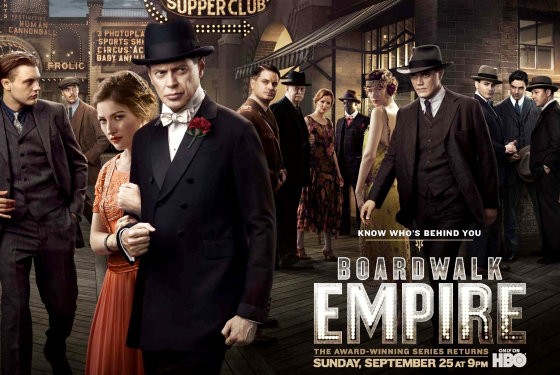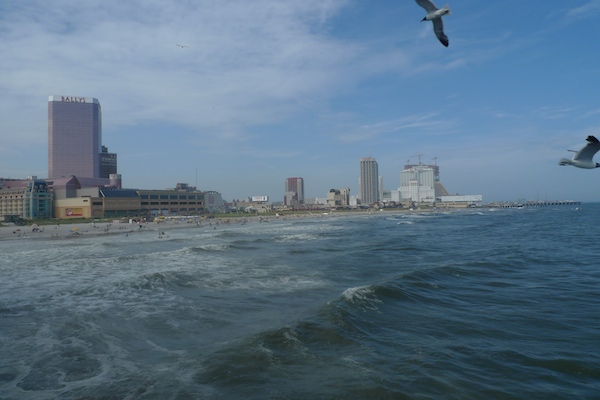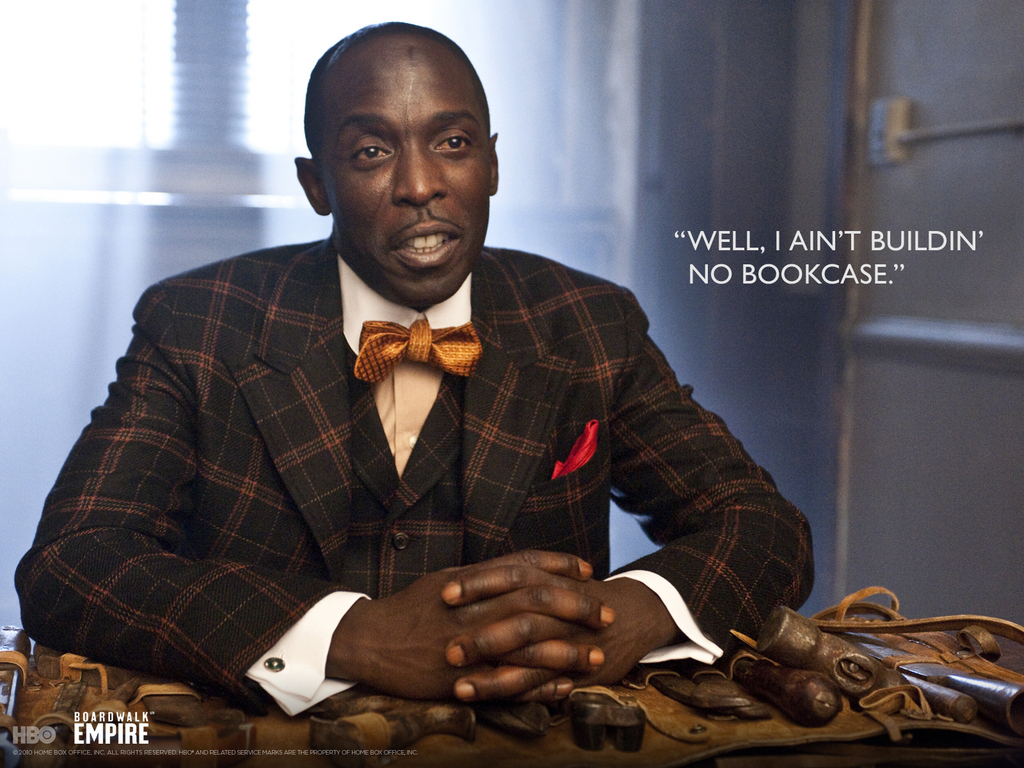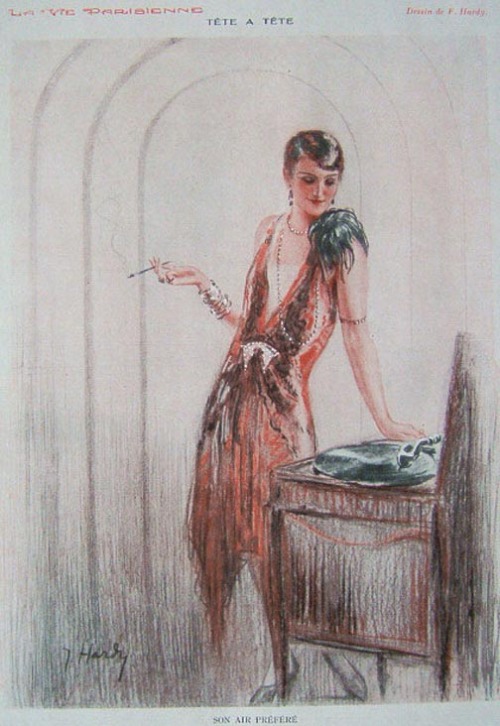
Boardwalk Empire HBO
Based on the book, Boardwalk Empire: The Birth, High Times, and Corruption of Atlantic City, by Nelson Johnson, the show takes us back to Atlantic City in the 1920s, specifically to the time of US Prohibition between 1919 and 1933. Character Nucky Thompson, played by Steve Buscemi, is the main character of the series. He is based on Enoch L. Johnson, who ran Atlantic City's Republican party (and many of the city's illegal organizations) from the 1910s until 1941.
Atlantic City during that time was a favorite vacation spot for upper class and middle class people from New York City, the surrounding New Jersey area and Philadelphia. The popularity of the automobile during the 1920s enabled people to engage in tourism across the United States, and Atlantic City's beaches and boardwalk made for a perfect holiday getaway.
Nucky Thompson, in season two of Boardwalk Empire, has relinquished his role as sheriff of Atlantic City to his younger brother. He is now the Atlantic County Treasurer, handling a great deal of money for the county. He is more and more aware of the burgeoning public pressure (perpetrated by the FBI and IRS now, instead of the easily bribed Atlantic City police) on himself and his operations. This pressure is exerted in the form of an election fraud charge. In the series, Nucky calls on his buddy the Attorney General to help him get out of it. In order for the charge to disappear, Nucky must be convicted on national charges for the Attorney General to have leeway over the verdict. Thus Nucky manipulates the local government to find his prostitution rings (by paying prostitutes to go over to the police department and loudly claim that they are, indeed, prostitutes) which elevates his case to the national level. This political maneuvering was not uncommon for 1920s Atlantic City. Real-life Johnson himself made $500,000 annually in kickbacks from his various organizations, an enormous sum even today.

Boardwalk Empire Main Cast
HBO
HBO
Real-life Enoch Johnson did act as sheriff in Atlantic City (and his brother eventually took the role after him) but his primary position was more as the face of organized crime. He did not have an official position within the Republican Party. The IRS and FBI did launch an investigation into Johnson's practices, but not until 1936. So the timing was off for the series in order to heighten drama.
Nucky Thompson/Johnson, both in the show and in real-life, have an attitude towards the vices of Atlanic City that is quite unique. In the show, Nucky does engage in some risque behavior with Ziegfeld Follies girl Lucy Danziger, but he does not disrespect women. He helps flappers, prostitutes and any woman within his territory with babies born out of wedlock. He provides money to the Women's Temperance League among other causes, and even speaks at one of their events in the show. He is a generous man to the community around him.

Nucky Thompson/Johnson, lives by his own maxim: "When I lived well, everybody lived well" (The New York Times). Also, Nucky is not a drunk despite his huge influence as a bootlegger. This parallels Johnson, who was reportedly a teetotaler until his first wife's death of tuberculosis. Even afterwards, he was not recalled as a heavy drinker. This slight aversion to alcohol does not mean that the man tries to prevent others from drinking or other vices in Atlantic City. As Johnson said to The New York Times in 1968, "We have whiskey, wine, women, song and slot machines. I won’t deny it and I won’t apologize for it. If the majority of the people didn’t want them they wouldn’t be profitable and they wouldn’t exist. The fact that they do exist proves to me that the people want them". This attitude led to Atlantic City being called "America's Playground" or "The World's Playground" both in real-life and the show.


Nucky Thompson
Nucky Thompson/Johnson, lives by his own maxim: "When I lived well, everybody lived well" (The New York Times). Also, Nucky is not a drunk despite his huge influence as a bootlegger. This parallels Johnson, who was reportedly a teetotaler until his first wife's death of tuberculosis. Even afterwards, he was not recalled as a heavy drinker. This slight aversion to alcohol does not mean that the man tries to prevent others from drinking or other vices in Atlantic City. As Johnson said to The New York Times in 1968, "We have whiskey, wine, women, song and slot machines. I won’t deny it and I won’t apologize for it. If the majority of the people didn’t want them they wouldn’t be profitable and they wouldn’t exist. The fact that they do exist proves to me that the people want them". This attitude led to Atlantic City being called "America's Playground" or "The World's Playground" both in real-life and the show.

1920s Atlantic City Boardwalk
One of the most historically accurate Johnson/Thompson qualities is the wearing of a carnation in one buttonhole. Johnson wore a different carnation in his suit buttonhole daily, and Steve Buscemi loyally recreates this image despite their other different physical characteristics:

Enoch Johnson (LEFT) and Nucky Thompson (RIGHT)
Atlantic City, at the time, was an excellent place for Americans to have fun. Miles of beaches with nice homes, for rent or for sale, provided an excellent summer getaway. The Boardwalk was full of ice cream shops, saltwater taffy stores, and even carnival rides. "The Bathers Revue" was a favorited staple of the Atlantic City summer, with rows of bathing babes (1000 total) strutting down the Boardwalk to be seen by over 500,000 spectators annually (New York Daily News). In addition to beautiful women and beauty competitions (including the precursor to the Miss America contest) for entertainment, there were saloons, carnivals, casinos, gambling on horse/dog/car races, fancy hotels and beach resorts, and whorehouses.

1924 Beauty Parade with 300,000 Spectators
Precursor to the Miss America Pageant
New York Daily News: http://www.nydailynews.com/entertainment/real-boardwalk-empire-atlantic-city-prohibition-1920s-gallery-1.90270?pmSlide=6

The Marlborough-Blenheim Hotel of Atlantic City
A Seaside Spa and Hotel Resort
1910

Atlantic City Speedway
1926
According to the Atlantic City Free Public Library, "prohibition was largely unenforced in Atlantic City, and, because alcohol that had been smuggled into the city with the acquiescence of local officials could be readily obtained at restaurants and other establishments, the resort's popularity grew further". Because Atlantic City has ocean access, it could easily obtain liquor from various ships passing through. In the second season of Boardwalk Empire, ships carrying booze unload at the dockyards with bottles of liquor in crates labelled "Canadian Syrup" and "Irish Oats". Ireland and Canada are important avenues for alcohol in the series. Additionally, with the availability of automobiles, bootleggers were able to commute to and from city centers with their liquor. This enabled them to avoid interaction with officials on trains, and promoted the business.
Relationships with the United States Navy were vital for the bootleggers' ventures to continue. In the series, the Commodore is a man with naval ties who formerly ran Atlantic City's illegal rackets. Nucky was his protege in some ways, but there is no love lost between the two men. The Commodore wants control of Atlantic City back, claiming that he "built this town" and that he will ominously "take care of Nucky". In real-life, Johnson did have a friendly relationship with a Commodore, but he was the chairman of an Atlantic City yacht club. This man, Louis Kuehnle, was known as a power broker for the Republican Party, and had this position usurped by Johnson when he eventually went to jail for illegal dealings in 1913. The inheritance of positions is clear, both in the show and in reality.

Atlantic City Port and Beach
Racial tensions during the time are highlighted in the series by African-American bootlegger Chalky White. In the second season, Chalky's men are ambushed at their liquor warehouse by Ku Klux Klansmen. Chalky's adamant statement during the episode that the city couldn't be run without the 10,000 black men was largely true. Of its approximately 55,000 residents in the 1920s, 22% of them were black. They were involved in many of the communities on Atlantic City's "Northside", with schools and their own business league (Atlantic City Free Public Library). Furthermore, according to Ku Klux Klan history, in 1923 "in Atlantic City, the extremely active local Klansmen accused the city government of protecting vice and lawlessness". If there were African American bootleggers, they probably were the target of KKK in the area, vocally and otherwise. So the story shown in the HBO series could've definitely happened.

Chalky White (Michael Kenneth Williams)
<http://images4.fanpop.com/image/photos/16900000/Chalky-White-boardwalk-empire-16933046-1024-768.jpg>.
The liberation of women is an important theme in Boardwalk Empire, as one of the character's wives, Angela Darmody, is shown to have lesbian tendencies and engages in sexually risque activities in many liberal houses in Atlantic City. Lesbianism was not something totally new in 1920s America. In 1922 Gertrude Stein published Miss Furr and Miss Skeene in magazine Vanity Fair, about an American lesbian couple emigrating to Paris to live out their lifestyle. Angela also has dreams of moving to Paris with one of her lesbian lovers, and almost does so but is caught by her husband Jimmy before departing. Paris was a city for all types of love at the time, and had a huge ex-patriot population of Americans from the first World War. The traditional domestic vocations of women were apparent during the 1920s, but there were some nuances. Personal appliances for pleasure, such as record players and radios, were reason for celebration for many women stuck at home all day. This was clear in the Boardwalk Empire episode when Lucy, the ex-Ziegfeld Follies girl, receives a gift phonograph. Her happiness at receiving such a present was enough to prevent her from committing suicide.

The liberalization of women during the Jazz Age with voting rights and a more consumer based culture, encouraging women to make opinions about what appliances to include in their homes, also included sexual experimentation. New York City, Berlin and Paris were all hotbeds for lesbian activity during the time.

Flapper Listening to Gramophone
The liberalization of women during the Jazz Age with voting rights and a more consumer based culture, encouraging women to make opinions about what appliances to include in their homes, also included sexual experimentation. New York City, Berlin and Paris were all hotbeds for lesbian activity during the time.

Lesbians in 1920 at one of New York City's first gay bars.
The argument has been made that without the underground mafia culture, lesbianism would've died out with Prohibition due to the negative atmosphere and reaction of the 1920s and 1930s in mainstream society. Instead, the underground world kept lesbianism going.
The mainstream society in Boardwalk Empire also feels the reverberations from WW1 veterans returning from service. The most obvious example is Richard Harrow, an assassin loyal to Nucky's protege Jimmy Darmody, who is a fellow veteran. Harrow is a member of the infant biomedical movement, with a painted tin cover for half of his face which was badly damaged in the war. World Wars I and II would usher in the age of biomedical technology, with contact lenses, prosthetic limbs, surgery techniques and understanding of composite materials originating on the battlefields. Harrow's assassin skills in the war are now used for mob movements. PTSD, depression and suicidal tendencies are common in Harrow, who suffers because of his physical difference and personal mental torture that he is not wanted or capable of being loved by society.
The mainstream society in Boardwalk Empire also feels the reverberations from WW1 veterans returning from service. The most obvious example is Richard Harrow, an assassin loyal to Nucky's protege Jimmy Darmody, who is a fellow veteran. Harrow is a member of the infant biomedical movement, with a painted tin cover for half of his face which was badly damaged in the war. World Wars I and II would usher in the age of biomedical technology, with contact lenses, prosthetic limbs, surgery techniques and understanding of composite materials originating on the battlefields. Harrow's assassin skills in the war are now used for mob movements. PTSD, depression and suicidal tendencies are common in Harrow, who suffers because of his physical difference and personal mental torture that he is not wanted or capable of being loved by society.

Richard Harrow (Jack Huston)
Richard Harrow is a beautiful character in this series, because he is so complex. Embodying the theme of a soldier that cannot move on from the battlefield, he is a powerful component of any mob because of his sheer skill. Harrow is an outsider, but welcomed by Darmody, who sees the fellow veteran in him. This history of a soldier coming home from war was not to be a new theme for the American public.
The episodes of Boardwalk Empire, each an hour long, are a fascinating history into the Jazz Age of Atlantic City. While historic discrepancies appear, there are many factual consistencies and the drama makes for an intriguing and gripping watch. Boardwalk Empire, by focusing on Atlantic City and the surrounding area, also has a refreshing landscape instead of the usual Los Angeles or New York City skyline we see in television today. With brilliant acting, spot-on costumes, and fresh dialogue, this is one show that shouldn't be ignored.
References
Boardwalk Empire. HBO. 2010-2012.
Evans, Hiram Wesley. "Various Activities of the Ku Klux Klan".
<http://www.kkklan.com/various.htm>.
"Enoch L. Johnson, Ex-Boss in Jersey – Prohibition-Era Ruler of Atlantic City, 85, Dies". The New York Times. December 10, 1968. p. 47.
<http://www.kkklan.com/various.htm>.
"Enoch L. Johnson, Ex-Boss in Jersey – Prohibition-Era Ruler of Atlantic City, 85, Dies". The New York Times. December 10, 1968. p. 47.
"Nucky's Empire: The Prohibition Years". The Atlantic City Free Public Library. <http://www.atlanticcityexperience.org>.
"The Real Boardwalk Empire: Atlantic City during Prohibition in the 1920s". New York Daily News. September 24, 2010. <http://www.nydailynews.com/entertainment/real-boardwalk-empire-atlantic-city-prohibition-1920s-gallery-1.90270?pmSlide=17>.
"Underground: Pre-Stonewall Gay and Lesbian New York". June 22, 2009. <http://theboweryboys.blogspot.com/2009/06/underground-pre-stonewall-gay-and.html>.
No comments:
Post a Comment